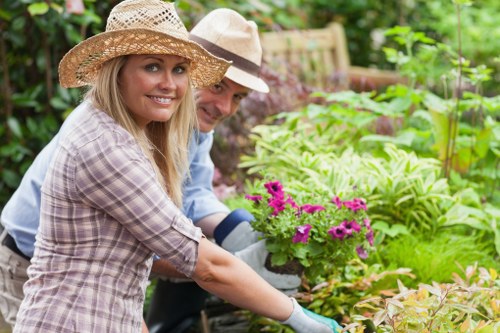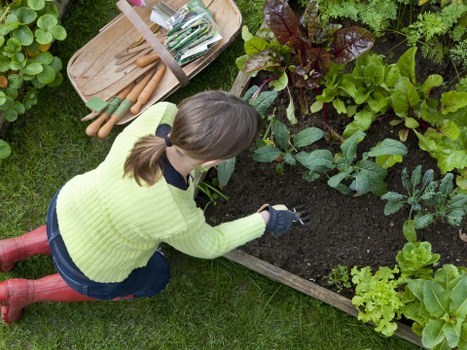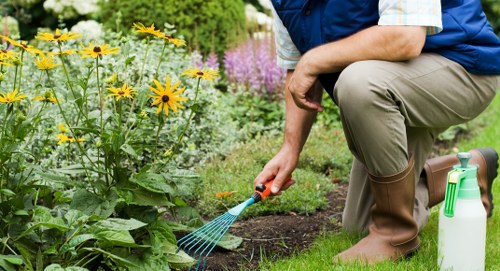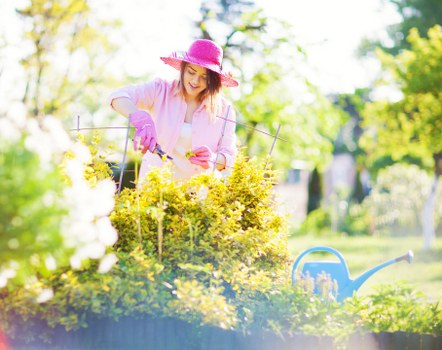Gardener in Garden Fencing: Enhancing Your Outdoor Space

The Importance of Garden Fencing
Garden fencing plays a pivotal role in defining the boundaries of your outdoor space. It not only **enhances the aesthetic appeal** of your garden but also provides practicality by offering security and privacy. A well-designed fence can transform your garden into a serene retreat or a lively gathering spot, depending on your preferences.
For gardeners, the right fence serves as a protective barrier against unwanted intruders, whether they are animals or pests that might threaten your plants. Moreover, it helps in organizing different sections of your garden, allowing you to manage various plants and garden features effectively.
Choosing the correct type of garden fencing is essential for maintaining the health and beauty of your garden. It ensures that plants receive the right amount of sunlight and protection from harsh weather conditions. Additionally, a sturdy fence can support climbing plants, adding another layer of beauty and interest to your garden.

Types of Garden Fencing
Wooden Fences
Wooden fencing is a classic choice for many gardeners. It offers a natural and warm appearance that blends seamlessly with most garden landscapes. Wood fences are versatile and can be customized with various stains and paints to match your garden's color scheme.
One of the significant advantages of wooden fences is their **durability** and ability to withstand different weather conditions. They can be treated to resist rot and pests, ensuring a long-lasting barrier for your garden.
However, wooden fences require regular maintenance to prevent deterioration. This includes periodic staining, painting, and repairs to address any damage or wear over time.
Metal Fences
Metal fences, such as wrought iron or aluminum, provide a **sleek and modern look** to your garden. They are known for their strength and durability, making them an excellent choice for security purposes. Metal fences are also low-maintenance, requiring minimal upkeep compared to wooden alternatives.
Additionally, metal fences can be designed with intricate patterns and decorative elements, adding an artistic touch to your garden. They are ideal for creating a formal and structured appearance.
One drawback of metal fences is that they can be prone to rusting if not properly treated or maintained, especially in areas with high humidity or rainfall.

Vinyl Fences
Vinyl fencing has gained popularity due to its **low maintenance** and longevity. It is resistant to weather elements, pests, and rot, making it a practical choice for busy gardeners who prefer easy upkeep.
Vinyl fences are available in a variety of styles and colors, allowing for versatility in design. They can mimic the appearance of wood without the associated maintenance costs and efforts.
While vinyl fences are initially more expensive than some other materials, their durability and minimal maintenance requirements can result in cost savings over time.
Composite Fences
Composite fencing combines the best features of both wood and vinyl. It is made from a mixture of wood fibers and plastic, resulting in a material that is both durable and aesthetically pleasing.
Composite fences require less maintenance than traditional wood fences and are more environmentally friendly, as they often use recycled materials in their construction.
They are available in various colors and styles, providing flexibility in design while ensuring longevity and resistance to common outdoor challenges.

Choosing the Right Fence for Your Garden
Consider Your Garden's Purpose
Before selecting a fence, it’s crucial to consider the primary purpose it will serve in your garden. Are you looking to enhance privacy, secure your plants from animals, or simply add a decorative element?
If privacy is a significant concern, a taller wooden or vinyl fence might be the best option. For gardeners focused on aesthetics, metal or composite fences with decorative details can add visual interest without compromising functionality.
Additionally, consider whether you need the fence to support climbing plants or act as a boundary marker. This will influence the height, material, and design of the fence you choose.
Assessing Material Durability
Different fencing materials offer varying levels of durability. Wooden fences, while beautiful, require regular maintenance to prevent decay. Metal fences are robust but may need protective coatings to prevent rust.
Vinyl and composite fences are highly durable and low-maintenance, making them suitable for gardeners seeking a long-lasting solution with minimal upkeep.
Evaluate the climate in your area and how it may affect the longevity of your chosen fence material. Selecting a material that can withstand local weather conditions will ensure your fence remains functional and attractive for years to come.
Budget Considerations
Your budget will play a significant role in determining the type of fence you can afford. Wooden fences are generally more affordable initially but may incur higher maintenance costs over time.
Metal fences tend to be more expensive upfront but offer greater durability and lower maintenance needs. Vinyl and composite fences fall in the mid to high price range but provide excellent longevity and minimal upkeep.
It's essential to balance the initial cost with long-term benefits to choose a fencing option that fits both your budget and your garden's needs.

Installation Tips for Garden Fencing
Planning and Measurements
Accurate planning and measurements are critical for a successful fence installation. Begin by mapping out the perimeter of your garden to determine the amount of fencing material required.
Consider the terrain and any existing structures or plants that may influence the placement of fence posts and panels. Proper planning helps in avoiding unnecessary adjustments and ensures a seamless installation process.
It’s also advisable to check local regulations or homeowners’ association guidelines that may dictate fence height, style, or placement. Ensuring compliance can prevent future disputes or the need for modifications.
Preparing the Ground
Proper ground preparation is essential for the stability and longevity of your fence. Clear the installation area of any debris, rocks, or plants that could interfere with the fence posts.
For wooden and metal fences, digging post holes to the appropriate depth is necessary to ensure the fence remains upright and secure. Typically, fence posts should be buried at least one-third of their total length underground.
Use gravel as a base for the posts to promote drainage and prevent rotting in wooden fences. For metal fences, ensure the posts are set in concrete to provide maximum stability.
Securing the Fence
Properly securing each fence panel or section is crucial for the fence's overall integrity. Start by installing the fence posts firmly in the ground, ensuring they are level and spaced correctly according to your fence design.
Attach the fence panels to the posts using appropriate hardware, such as screws, nails, or brackets. For added strength, consider using additional supports or braces, especially for taller or heavier fences.
Regularly check the alignment and stability of the fence during installation to make necessary adjustments promptly.
Maintenance Practices
Regular maintenance extends the life of your garden fence. For wooden fences, inspect for signs of rot, warping, or pest damage and address any issues immediately.
Metal fences should be checked for rust or corrosion, applying protective coatings as needed to prevent further deterioration.
Vinyl and composite fences require minimal maintenance but should still be periodically cleaned to remove dirt and debris, ensuring they remain in pristine condition.
Integrating Fencing with Garden Design
Creating Visual Interest
A well-integrated fence can serve as a focal point in your garden design. Use decorative elements like trellises, lattice panels, or ornamental finials to add character and charm.
Incorporate climbing plants such as roses, vines, or ivy to enhance the visual appeal of the fence, creating a lush and vibrant backdrop for your garden.
Choose colors and materials that complement your garden's overall theme, whether it's modern, rustic, or traditional.
Maximizing Functionality
Beyond aesthetics, consider the functional aspects of your fence. Install gates that provide easy access while maintaining security. Use horizontal or vertical slats to control privacy levels and sunlight penetration.
Incorporate storage solutions, such as hooks or shelves, along the fence to organize gardening tools and accessories, keeping your outdoor space tidy and efficient.
Enhancing Privacy and Security
For gardeners seeking privacy, taller fences with solid panels are ideal. They block the view from neighbors or passersby, creating a secluded space for gardening activities.
Secure fencing materials deter unwanted animals and pests, protecting your plants from damage.
Consider adding motion-sensor lights or security cameras near fence areas to enhance safety and provide peace of mind.
Sustainable Fencing Options
Eco-Friendly Materials
Sustainability is increasingly important in garden design. Opt for eco-friendly fencing materials like recycled metal, bamboo, or sustainably sourced wood to minimize your environmental impact.
Composite fences made from recycled materials offer durability and a lower environmental footprint compared to traditional options.
Using natural materials helps your fence blend harmoniously with the surrounding landscape, promoting a healthy ecosystem.
Incorporating Green Elements
Integrate green elements into your fence design to promote biodiversity and environmental health. Install birdhouses or insect hotels on your fence to attract beneficial wildlife.
Planting native species along the fence line enhances biodiversity and supports local pollinators, contributing to a thriving garden ecosystem.
Energy Efficiency
While fencing itself does not directly contribute to energy efficiency, its proper placement can help in regulating sunlight and shading in your garden area. This can create a more comfortable environment for plants and reduce the need for additional shading structures.
Conclusion
Choosing the right garden fencing is a crucial decision for any gardener looking to enhance their outdoor space. It combines functionality with aesthetics, providing security, privacy, and a beautiful boundary for your garden. By considering factors such as material durability, design, cost, and sustainability, you can select a fence that not only complements your garden but also stands the test of time.
Whether you prefer the timeless appeal of wood, the modern elegance of metal, or the low-maintenance benefits of vinyl and composite materials, there's a fencing solution to meet your needs. Proper installation and regular maintenance will ensure your fence remains a valuable asset to your garden for years to come.
Embrace the transformative power of garden fencing and create an outdoor space that is both beautiful and functional. Contact us today to explore the best fencing options for your garden and take the first step toward a more enchanting and secure outdoor haven.
Get Started with Your Garden Fencing Project
Ready to enhance your garden with the perfect fence? Our team of experienced gardeners and fencing specialists is here to help you every step of the way. From selecting the ideal material to expert installation and maintenance, we ensure your garden fencing project is a success.
Don’t wait to transform your garden into the sanctuary you’ve always dreamed of. Book your service now and let us help you create a beautiful, secure, and sustainable outdoor space.
- Customized fence designs tailored to your garden's needs
- High-quality materials for lasting durability
- Professional installation services by experienced gardeners
- Ongoing maintenance to keep your fence looking its best
- Eco-friendly options for sustainable gardening
Take the first step toward a more beautiful and functional garden. Contact us today to discuss your fencing needs and receive a free consultation.